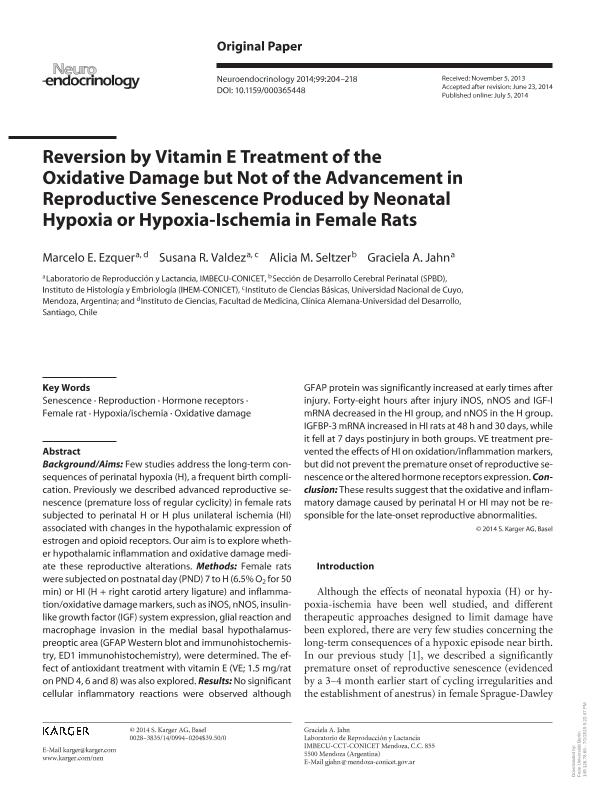Artículo
Reversion by Vitamin E treatment of the oxidative damage but not of the advancement in reproductive senescence produced by neonatal hypoxia or hypoxia-ischemia in female rats
Fecha de publicación:
07/2014
Editorial:
Karger
Revista:
Neuroendocrinology
ISSN:
0028-3835
Idioma:
Inglés
Tipo de recurso:
Artículo publicado
Clasificación temática:
Resumen
Background/Aims: Few studies address the long-term consequences of perinatal hypoxia, a frequent birth complication. Previously we described advanced reproductive senescence (premature loss of regular cyclicity) in female rats subjected to perinatal hypoxia (H) or hypoxia plus unilateral ischemia (HI) associated with changes in hypothalamic expression of estrogen and opioid receptors. Our aim is to explore whether hypothalamic inflammation and oxidative damage mediate these reproductive alterations.Methods: Female rats were subjected on post-natal day (PND) 7 to H (6.5 % O2 for 50 min) or HI (H + right carotid artery ligature) and inflammation/oxidative damage markers such as iNOS, nNOS, IGF system expression, glial reaction and macrophage invasion in the medial basal hypothalamus-preoptic area (GFAP Western blot and immunohistochemistry, ED1 immunohistochemistry) were determined. The effect of antioxidant treatment with vitamin E (VE, 1.5 mg/rat on PND4, 6 and 8) was also explored. Results: No significant cellular inflammatory reactions were observed although GFAP protein was significantly increased at early times after injury. 48 h after injury iNOS, nNOS and IGF-I mRNA decreased in the HI group and nNOS in the H group. IGFBP-3 mRNA increased in HI rats at 48 h and 30 days, while it fell at 7 days post-injury in both groups. VE treatment prevented the effects of HI on oxidation/inflammation markers, but did not prevent the premature onset of reproductive senescence or the altered hormone receptors expression. Conclusion: these results suggest that the oxidative and inflammatory damage caused by perinatal H or HI may not be responsible for the late-onset reproductive abnormalities.
Archivos asociados
Licencia
Identificadores
Colecciones
Articulos(IHEM)
Articulos de INST. HISTOLOGIA Y EMBRIOLOGIA DE MEND DR.M.BURGOS
Articulos de INST. HISTOLOGIA Y EMBRIOLOGIA DE MEND DR.M.BURGOS
Articulos(IMBECU)
Articulos de INST. DE MEDICINA Y BIO. EXP. DE CUYO
Articulos de INST. DE MEDICINA Y BIO. EXP. DE CUYO
Citación
Ezquer, Eduardo Marcelo; Valdez, Susana Ruth; Seltzer, Alicia Mabel; Jahn, Graciela Alma; Reversion by Vitamin E treatment of the oxidative damage but not of the advancement in reproductive senescence produced by neonatal hypoxia or hypoxia-ischemia in female rats; Karger; Neuroendocrinology; 99; 3-4; 7-2014; 204-218
Compartir
Altmétricas




